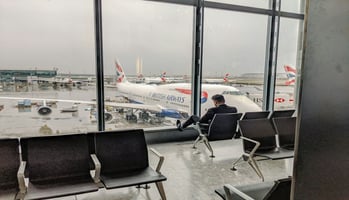More than 270,000 disrupted air passenger journeys.
“Sorry, my phone was on silent.”
We’ve all been there and used this excuse at times.
But how many have said it during a high-profile crisis comms incident?
Not got time to keep reading? Listen to the blog instead
It has emerged that a silent phone was why Heathrow CEO Thomas Woldbye was uncontactable during a power outage at the airport caused by a fire at a nearby electricity substation.
Or, to use the words of an internal report, his phone had “gone into a silent mode, without him being aware it had done so, and he was asleep at the time”.
The report, led by Ruth Kelly, a former secretary of state for transport, found that the boss “was not involved” in the decision to suspend operations, and he was unaware of several attempts to reach him. This included two alerts known as F24 alarms and calls from the airport's chief operating officer Javier Echave
The report said: "Although his phone was on his bedside table, Mr Woldbye reported that it did not alert him to the F24 alarms or to Mr Echave's other calls because the phone had gone into a silent mode, without him being aware it had done so and he was asleep at the time.”
There are two fascinating points about this from a crisis media management point of view.
Firstly, the fact the CEO was uncontactable during an incident that ultimately led to the airport being closed for around 16 hours and caused travel chaos for nearly 300,000 passengers is clearly not a good look.
Yes, the report argues that the decision to suspend operations was “correctly made” and would not have changed if Mr Woldbye had been contactable.
But the optics of the leader being asleep while this happened are not good. And perception matters.
Here’s what the media made of it:
Perhaps not the headlines you would envisage following a report that concluded the airport had responded "efficiently and smoothly".
If you work for Heathrow, you would undoubtedly be frustrated by those findings being so overshadowed.
But the media’s focus on the failure to rouse the sleeping boss is understandable.
As we stress during our media training courses, stories are about people. And Mr Woldbye remains at the centre of this one. His actions – or lack of them – also hint at the element of trouble journalists look for. And offers a scapegoat.
We should say the review has said that Mr Woldbye expressed "his deep regret at not being contactable during the night of the incident".
But that seems unlikely to end the ‘asleep on the job’ narrative that surrounds him and the incident any time soon.
The other part to focus on from the findings is that this version of events differs from what was said at the time of the incident in March.
When the Sunday Times reported Mr Woldbye had gone back to bed during the early stages of the crisis to ensure he was well rested, a Heathrow Airport spokesperson described that account of events as "ill-informed misinformation".
Strong words.
And the spokesperson told the Daily Mail: "Thomas, and his whole senior leadership team, were exactly where they were supposed to be during an incident of this scale."
But we now know that was not the case.
And that raises clear questions about trust.
Crises place teams under intense pressure.
Heathrow would have faced a huge amount of media calls during the incident.
And some of them may have felt unhelpful in the heat of the moment.
But if you label them as “misinformation”, you must be 100 per cent sure that is the case.
Clear, consistent and transparent communication is crucial in successful crisis media management and maintaining trust.
The CEO being uncontactable would not have been a narrative the airport would have wanted during the crisis.
But it has emerged a few months later anyway.
And the result has been a second set of damning headlines about the CEO being asleep or uncontactable during a major incident when it may have got away with one batch with greater initial transparency.
The inquiry review has recommended Heathrow considers having a "second means of contact" to notify key individuals about critical incidents.
You can’t argue with that simple recommendation.
But should it take a major incident for that to be identified as a flaw in crisis preparedness? During my crisis comms days, I could be contacted on my work phone, personal mobile, landline and pager.
It is much better to identify crisis comms and business continuity plan gaps like this during crisis management testing that simulates real-life crises than them being exposed by the media during a real crisis. Especially a crisis that raises questions about the resilience of critical UK infrastructure.
Undoubtedly, the incident – and fallout – should be a wake-up call for other organisations.
Media First are media and communications training specialists with nearly 40 years of experience.
We have a team of trainers, each with decades of experience working as journalists, presenters, communications coaches and media trainers.
Click here to find out more about our crisis communication training courses, crisis communication training and media skills training.





